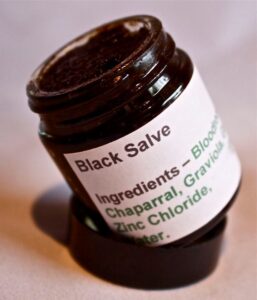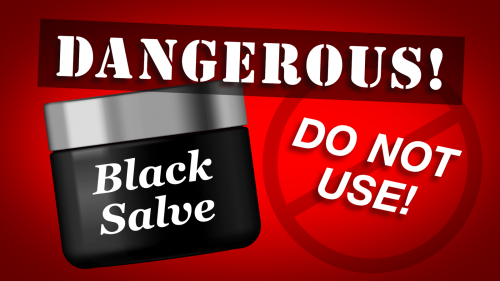Introduction:
In the realm of alternative and traditional medicine, black salve has emerged as a controversial yet intriguing topic, especially in its purported use for the treatment of skin cancer. In this blog post, we will delve into what black salve is, its ingredients, how it works, the historical context of its use for skin disease and cancer, and the stance of the Federal Drug Administration (FDA) on its application.
What is Black Salve?
Black salve is a paste-like substance that typically contains various herbal ingredients, most notably bloodroot (Sanguinaria canadensis), zinc chloride, and sometimes other botanical components. This unique concoction has gained attention for its historical use in treating various skin conditions, including skin cancer.
 Ingredients and How it Works:
Ingredients and How it Works:
Bloodroot, a key component of black salve, contains compounds known as alkaloids, notably sanguinarine. These alkaloids have been believed to exhibit cytotoxic properties, causing the destruction of abnormal or diseased cells. Zinc chloride, another ingredient, aids in tissue penetration and contributes to the caustic nature of the salve.
Historical Use for Skin Disease and Cancer:
“Black salve has a long history of use in traditional medicine, with anecdotes suggesting its application for treating skin conditions, including skin cancer,” says Dr. Adam Mamelak, skin cancer expert in Austin, Texas. Proponents of black salve claim that it selectively targets abnormal cells, allowing the salve to draw out and eliminate tumors or lesions. However, it’s essential to note that the efficacy and safety of black salve remain subjects of debate within the medical community.
FDA’s Stance on Black Salve:
The FDA takes a firm stance against the use of black salve for the treatment of skin cancer and other medical conditions. The agency warns against its use, citing the potential for severe tissue damage, scarring, and the delay of appropriate medical care. The FDA has not approved black salve as a safe and effective treatment, emphasizing the importance of seeking conventional medical guidance for the diagnosis and treatment of skin cancer.
Risks and Controversies:
While some individuals may share anecdotal success stories about using black salve, it is crucial to consider the associated risks and potential harm. “The caustic nature of the salve can lead to tissue destruction, scarring, and complications,” says Dr. Mamelak. “Many of these require extensive medical intervention.”
Conclusion:
While the historical use of black salve for skin conditions is intriguing, the lack of scientific evidence and the FDA’s warnings underscore the importance of approaching skin cancer treatment with caution. Seeking professional medical advice and opting for evidence-based treatments is crucial for ensuring the best possible outcomes. The debate surrounding black salve serves as a reminder of the importance of relying on scientifically validated approaches in the pursuit of effective and safe healthcare.

